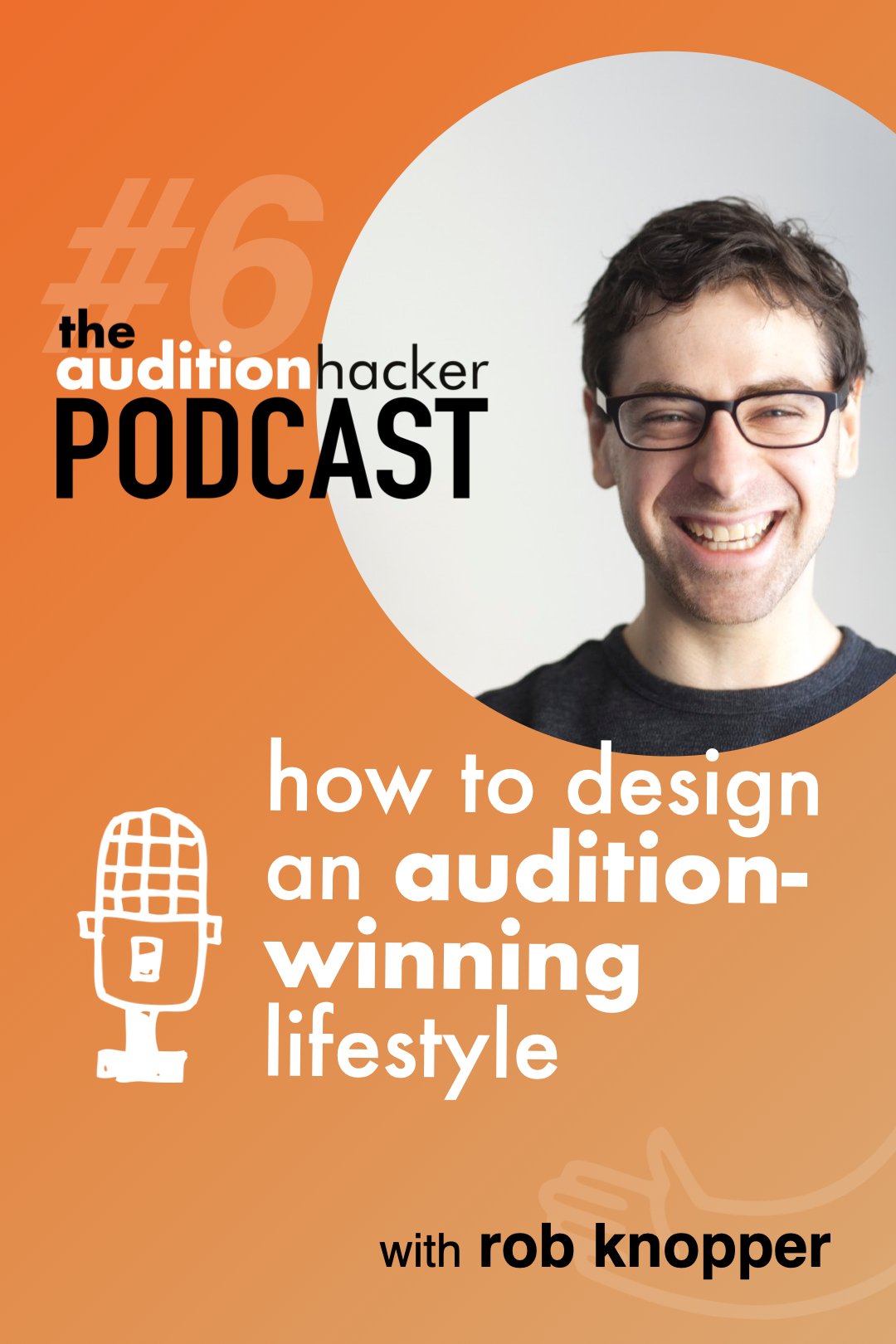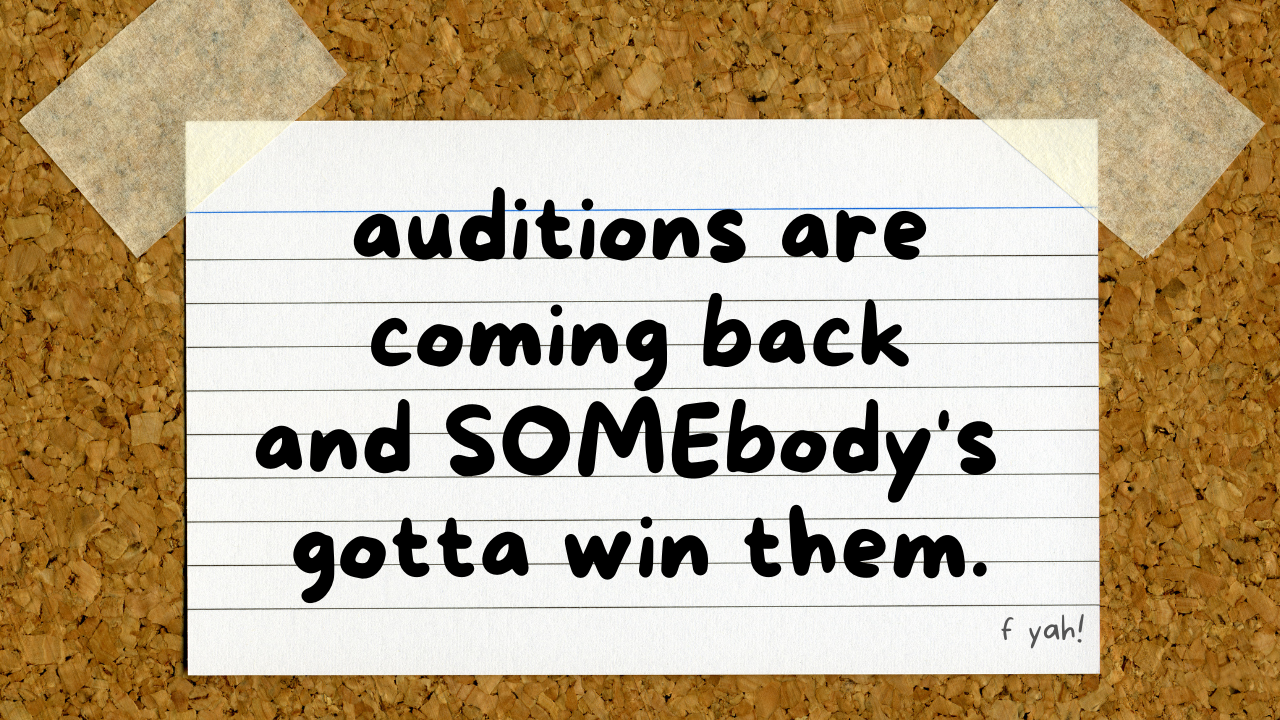last fall I went apple picking.
i rented a car, crossed the george washington bridge, and drove out to a random farm in nowhere-ville, new jersey. the way it works is you give them $15, they give you a paper bag, and you can put as many apples into that paper bag as you can. so i walked out to the rows of trees, and there they were.
SO MANY APPLES. (and so little space in my apple bag.)
there were apples everywhere, in all states: some were completely green and unripe, some were perfectly red and ready for immediate and reckless consumption. some were laying there on the ground, rotting. and literally everything in between.
(if you're rolling your eyes, don't worry: this relates to auditions.)
preparing for an audition?
here's my 5-step guide to constructing your preparation process and optimizing it for maximum results.
at first, i started grabbing any apples that looked decently edible. my bag was filled halfway in like 10 minutes. i had limited space, so i realized that i needed to start being more picky. i didn’t need to pick every decent apple - i wanted to have the best.
at some point, i changed my apple-picking game plan.
so partway through, i changed my tactic: i’d walk up to a tree, scan all the apples for ones without mistakes, and i’d identify the 3 or 4 least-bruised apples that were contenders. i would stare at each of those finalists for a few seconds, studying their color, shape, and general appley-ness. i could pick all of them, if i wanted, but i didn’t just want to fill up my bag with ok apples… i wanted the most extremely tastiest ones.
i also didn’t yet know what other apples were out there on different trees. i limited myself to one or two per tree, so that i could find the best of the best and fill my bag up with the nicest apples that i possibly could.
so, to recap: for each tree, i couldn’t stand there and stare at each apple for 20 seconds. i scanned the entire range of available apples in a couple seconds, identified a few front-runners that had the fewest obvious defects, and then intently studied the front-runners for beauty and perfection until i could choose the one or two very best ones. then i’d move on.
ok. it works the same way for auditions.
an audition panel is a team of professional with one goal: picking the best apple to join their orchestra. they start with a ton of applicants, and through each round of the audition, they narrow the field down from hundreds to 1. they’re all working with one main filter: their own set of musical standards. but along the way, depending on the round, they end up using different internal criteria to evaluate whether someone is fit to pass that round of the audition.
the two major questions that decide how they listen during each round are:
how many people are left to choose from, and
how long is there to listen to each one? (starting to see the comparison between auditions and apple-picking?)
let's break it down: prelims vs. finals
in the prelims, you’re weeding people out.
you’re looking for easily-cuttable mistakes.
the prelim round, basically.
here’s what i mean. the preliminary round is just a big sieve. in the prelim round, there might be 40 people in a single day. each of them are going to play the same 4 excerpts. as a judge, you have a deep understanding of music, with a unique sense of musicality, character, style, and beauty. but if you’re hearing the same 4 excerpts in a row, over and over, then you’re going to get used to listening to the same mistakes.
and it’s going to be easy to filter out the people who haven’t overcome those mistakes. you don’t get 15 minutes to explore the unique characteristics of each player. you get 4 minutes to notice whether they can uphold a basic standard of playing. all the notes should be in the right place. they should have good sound, a solid sense of pitch, a handle on dynamics, and a basic level of phrasing. you can’t dig into their playing to truly understand their musical soul. you're weeding people out.
you have 4 minutes to decide whether they are worthy of getting those 15 minutes in the later round.
as the performer, that means that your main purpose is not to give them any reason to cut you. if you play some notes in the wrong place, if you skip a line, if you have a brain malfunction, that’s going to be a clear reason to cut you. as a judge, you might breathe a sigh of relief - your decision is easy. if you hear a boring player without any obvious mistakes, you might hesitantly allow them to have another chance and play in the next round. but if there’s some musical interest and no obvious or glaring errors, then it will also be an easy choice to advance you to the next round.
in the finals, you’re exposing and evaluating the many layers of musicianship that make up a player.
a musician has many layers, like an onion. (OK, TOO MANY METAPHORS!)
once you’ve made it to the final round, you’ve made it through one or two rounds. you’ve proven that you can handle a few minutes of playing without any glaring errors, and they’ve finally offered you the opportunity to earn yourself a spot in the orchestra.
in the final round, they might be more likely to let one or two missed notes go by without penalizing you. everybody knows that in the natural course of human musicianship, missed notes happen. especially if you’re playing for 15 minutes versus 4 minutes. the odds are way more likely. however, they’ll be listening to shape and character. they’ll be imagining you sitting near them in the orchestra. they’ll be preparing to talk to other orchestra members after the audition, answering questions like, “what did the winning candidate sound like?” and “what made that candidate stand out?"
so they’re listening deeply to the full package, and they want to know you can bring something truly special to the table. they want to know that you can impress their colleagues and make them look good.
so, to sum up prelims vs. finals:
prelims are where they look for negative things, and finals are where they look for positive things. in prelims, they're looking for near-perfection, and in finals, they're looking for musical intrigue.
that’s so super-general, and it’s wayyy more complicated than that. each person on the panel is dealing with a unique set of musical priorities and thoughts spinning around their heads. each person has an idealized version of how they love music to sound and how they strive to make it themselves. but as they listen to applicants come and go, they end up having to make a very big decision: yes or no. their complex opinions on music end up having to come out as a black-and-white yes or no vote. now that you understand that, you can start planning your audition.
then how do you play each round differently?
don't play anything differently. find one interpretation that works for all the rounds.
first i’d like to say this: i never particularly thought of playing my prelim and final rounds differently. throughout my audition preparation, i worked on integrating the deep emotional content of the music into my muscle-memorization. i studied the character, the style, and i experimented with phrasing along the way. i field-tested phrasing ideas when i played for people in mock auditions. i shaped my excerpts in objective and subjective ways until i was comfortable with how they sounded under a microscope.
however, there are some things to keep in mind:
if you’re a risk-taker, you might scale that back in the prelim round. if you tend to overdo rubatos, to exaggerate dynamics, and to ignore those pesky little “written details” on the page in favor of musically exciting events, then you probably will need to spend a little bit of time shaping your excerpts to sound more like they look on the page. it’s easy for a panel to misunderstand something musical as being as unfortunate mistake, especially when they only hear you play for the 4 minutes of a final round.
if you’re a straight-ahead, consistent player without much right-brained activity, you might want to add a little something special to the final round. if you spend all your time working with the metronome and ironing out time, rhythm, pitch, and measurable details, then you’ll probably easily pass the first round. but here’s where you need to start working with the emotional content of the music. write down adjectives that describe the character or feeling of the music. look at pictures of the city the music was written in. think about the girl that the composer was trying to impress when he wrote the music. make the audience feel something. you want to try to go as far you can in the direction of musicality without knocking the measurable details out of place. these are the sorts of things that will make a musical impression on your audience: the audition panel.
and how the hell do you practice for all of this?
in your preparation, you can be driven by two goals here. If you were only interested in getting past the first round, then you’d want to find all your glaring errors, mistakes, issues, and force them into place. you’d want to remove every possible reason for getting cut. if you spent 10 years figuring out just how to get through the prelims, then you’re going to be a mistake-free machine who always gets to finals just for the simple fact that no one can ever find anything wrong about your playing.
however, once you get to the final round, you might end up losing. consistently. they’re always going to be waiting for something more from you. the people in the final round have something in common: they all got through two rounds of relatively mistake-free playing. they can all play. suddenly the panel is going to be listening to you more deeply, intently, and observing you in a wider range of musical situations. having no reason to get cut isn’t going to win you the job.
your preparation should address both goals: a mistake-free, problem-free, clean style of playing, with a deep sense of musicality, style, and emotion embedded into your playing from the very beginning. as you go through your auditioning career, think of your practice as working on perfection for the prelim round, and also working on all the musical interest components for the semi- and final rounds.
this is going to have both positive and negative effects on your auditioning experiences. if you can turn yourself into the complete package, it make take you longer in your life to ever advance in the first place. that’s because you spent all that time considering the emotional content of music, phrasing structures and musical devices while other people were spending that time working on ultra-perfection. so they ended up figuring out how to win a prelim round before you. but as soon as you figure out how to win a prelim round, you’ll also start rising to the top of semi- and final rounds, because you always thought of your goal as being a full-package player.
what do you think? leave a comment below.
looking for a breakthrough in auditions?
here's my 5-step guide to constructing your preparation process and optimizing it for maximum results.

















in 2019, a cellist named maria reached out to me about her audition struggles. on paper, she was the “worst audition candidate ever” (her words). she had 2 small children, a full-time teaching job, and hadn’t taken an audition in 4 years.